How Much Does It Cost to Rewire a 1,500 Sq Ft House?
Rewiring a house is a significant project that ensures the safety and efficiency of your home’s electrical system. The electrical system is one of the most critical components of your home, powering everything from lighting and appliances to heating and cooling systems. Whether you’re updating an old home or addressing specific electrical issues, understanding the costs associated with rewiring is crucial for effective budgeting and planning. This comprehensive guide will explore the costs involved in rewiring a 1,500 sq ft house, breaking down the expenses into detailed categories to provide a clear understanding of what to expect.
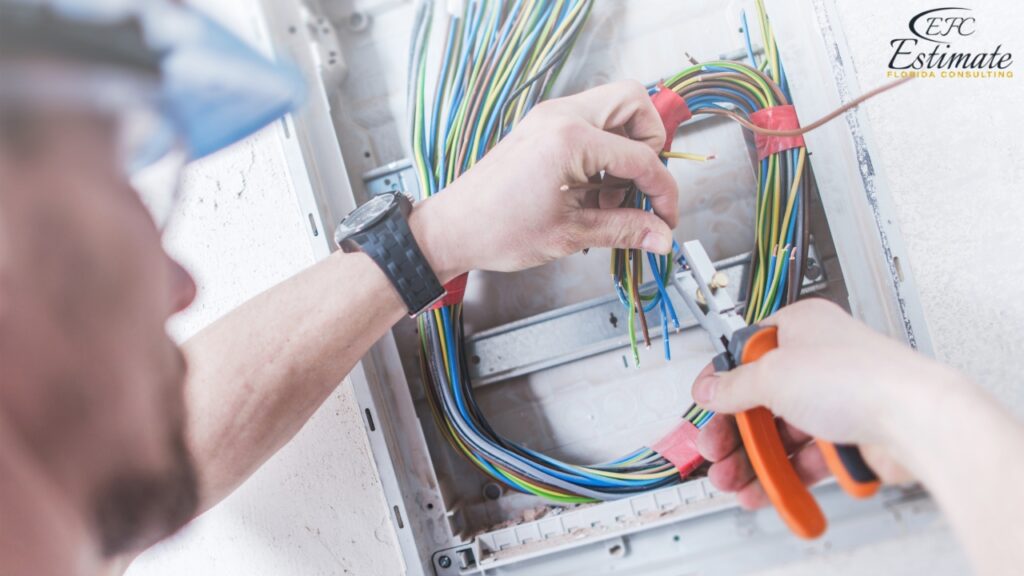
By being well-informed, you can make educated decisions, avoid common pitfalls, and ensure the success of your project. Properly planning for such a project can prevent unexpected expenses and ensure that the rewiring is done safely and efficiently.
Benefits of Rewiring a House
The cost to frame a 3,000 sq ft house typically ranges from $30.20 to $53.90 per square foot. This translates to a total cost range of $90,600 to $161,700. Here’s a more detailed cost breakdown:
Safety
Older wiring systems can pose significant safety risks, including fire hazards. Over time, wiring can deteriorate, connections can become loose, and insulation can degrade, increasing the risk of electrical fires. Upgrading the electrical wiring enhances the safety of your home by reducing the risk of electrical fires and other hazards. Ensuring that your home’s electrical system meets current safety standards is essential for protecting your property and the well-being of its occupants. Modern wiring materials and techniques are designed to provide greater reliability and durability, minimizing potential safety issues. This upgrade can prevent accidents and protect your family and belongings.
Increased Capacity
Modern electrical systems can handle the increased demand from today’s appliances and electronics, preventing overloaded circuits and improving overall functionality. Older systems were not designed to support the number and types of electrical devices commonly used today, leading to frequent circuit breaker trips and potential damage to appliances. Rewiring ensures that your home can accommodate all your electrical needs without issues, enhancing convenience and reliability. This upgrade allows for the installation of new technologies and appliances without compromising performance or safety, ensuring your home is equipped to handle future electrical demands. An upgraded system can support more advanced and energy-intensive appliances.
Energy Efficiency
Updated wiring can improve the energy efficiency of your home, potentially lowering your electricity bills by reducing power loss and ensuring efficient operation of electrical systems. Poor wiring can lead to energy loss through heat dissipation and electrical resistance. Newer wiring materials and techniques minimize these losses, helping you save on energy costs and reducing your home’s environmental impact. By optimizing the efficiency of your electrical system, you contribute to environmental conservation while enjoying the financial benefits of reduced energy consumption. Energy-efficient systems reduce waste and make your home more sustainable.
Property Value
Rewiring can increase the value of your property, making it more attractive to potential buyers by ensuring that the electrical system meets current safety and efficiency standards. A modern electrical system is a key selling point for homes, as it indicates that the property is safe, reliable, and less likely to require costly repairs. Upgrading your wiring can be a worthwhile investment, providing both immediate benefits and long-term returns. Homes with updated electrical systems are often viewed as more desirable by buyers, leading to faster sales and potentially higher offers. A well-wired home assures buyers of fewer maintenance issues and better overall quality.
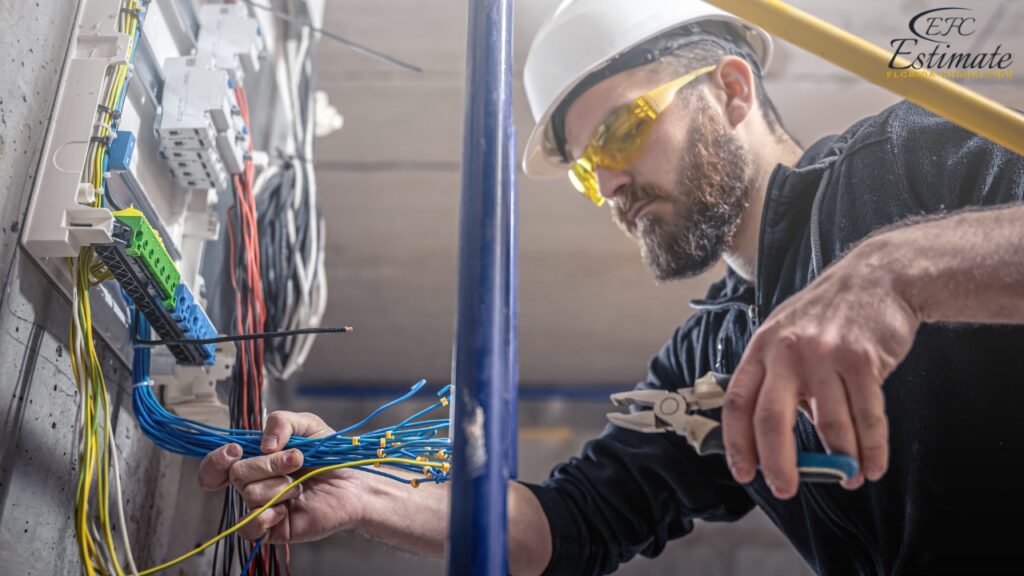
Average Cost Breakdown
The cost of rewiring a 1,500 sq ft house can vary based on several factors, including the age of the home, the complexity of the wiring, and local labor rates. On average, the cost can range from $14,140 to $30,380 or more. Here’s a general cost breakdown:
Construction Costs
Component | Estimated Cost |
Materials | $4,200 – $8,400 |
Labor | $8,540 – $18,200 |
Additional Costs | $1,400 – $3,780 |
Understanding this cost breakdown allows homeowners to budget accurately and avoid unexpected financial strains during the project. Each component plays a crucial role in the overall cost, and recognizing these can help in making cost-effective decisions.
Detailed Cost Breakdown
Materials
The cost of materials includes wiring, outlets, switches, circuit breakers, and other necessary components. High-quality materials can increase the cost but provide better durability and safety. Investing in good quality materials ensures that the electrical system will last longer and perform better. It also reduces the likelihood of future issues, saving you money on repairs and replacements in the long run. Using top-tier materials ensures that the system can handle the electrical load efficiently and reduces the risk of wear and tear over time. Durable materials also contribute to the long-term reliability of the electrical system, minimizing maintenance needs.
Cost Component | Estimated Cost |
Wiring and Cables | $2,800 – $4,900 |
Outlets and Switches | $560 – $1,260 |
Circuit Breakers | $840 – $2,240 |
High-quality wiring and components not only improve safety but also ensure optimal performance and energy efficiency, making them a valuable investment for any homeowner. Choosing the right materials can also affect the aesthetic appeal of the electrical installations, ensuring they match the home’s design.
90% More Chances to Win Projects With Our Estimate!
- Multi-Family Building
- Hotel Building
- Hospital Building
- Warehouse Building
- School & University Building
- High-Rise Building
- Shopping Complex
- Data Center Building
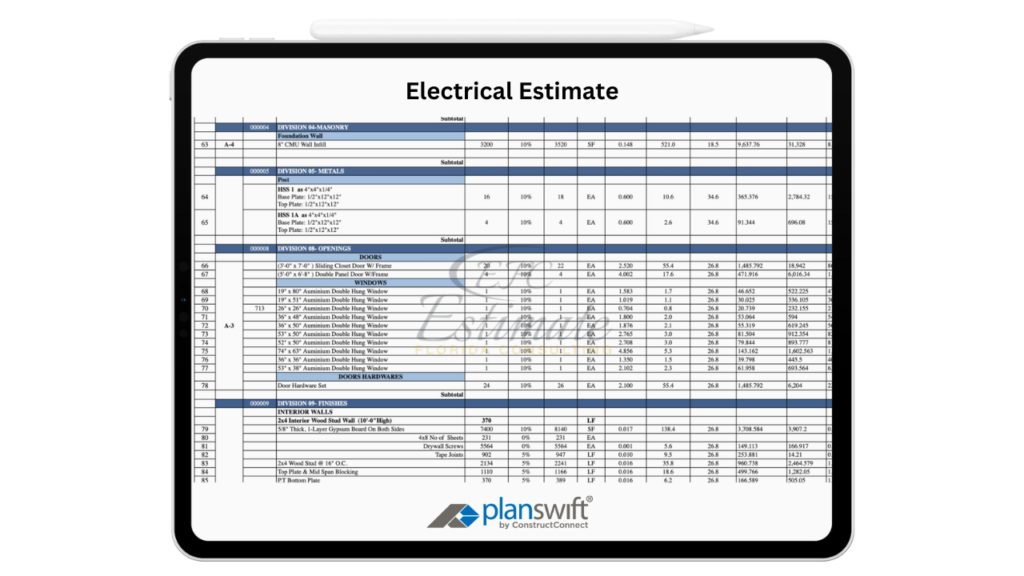
Labor
Labor costs include the time and expertise required to remove the old wiring, install the new wiring, and ensure proper operation. The total labor cost can vary based on the complexity of the project and the rates charged by local electricians. Experienced electricians might charge more, but their work can ensure the job is done correctly and efficiently, reducing the risk of future problems. Labor costs also encompass the meticulous work of testing and certifying the new system to ensure it meets all safety standards and operates as intended. Skilled labor ensures that the rewiring process is seamless and that all components are installed correctly.
Cost Component | Estimated Cost |
Removal of Old Wiring | $2,800 – $5,600 |
Installation of New Wiring | $4,900 – $9,800 |
Testing and Inspection | $840 – $2,800 |
Investing in skilled labor is crucial for ensuring the safety and efficiency of the rewiring project, as mistakes or shortcuts can lead to significant issues down the line. Professional electricians can also provide valuable advice on optimizing the electrical layout to enhance functionality.
Additional Costs
Additional costs can include permits, inspections, and any necessary repairs to walls or ceilings after the rewiring is complete. These costs can vary depending on local regulations and the specific requirements of the project. Proper permits and inspections ensure that the work meets local codes and safety standards, avoiding potential legal issues and ensuring the safety of the home’s electrical system. These additional costs are essential to ensure the project is compliant with all regulations and that the home is safe for occupants. They also cover any unforeseen expenses that might arise during the project, such as structural modifications.
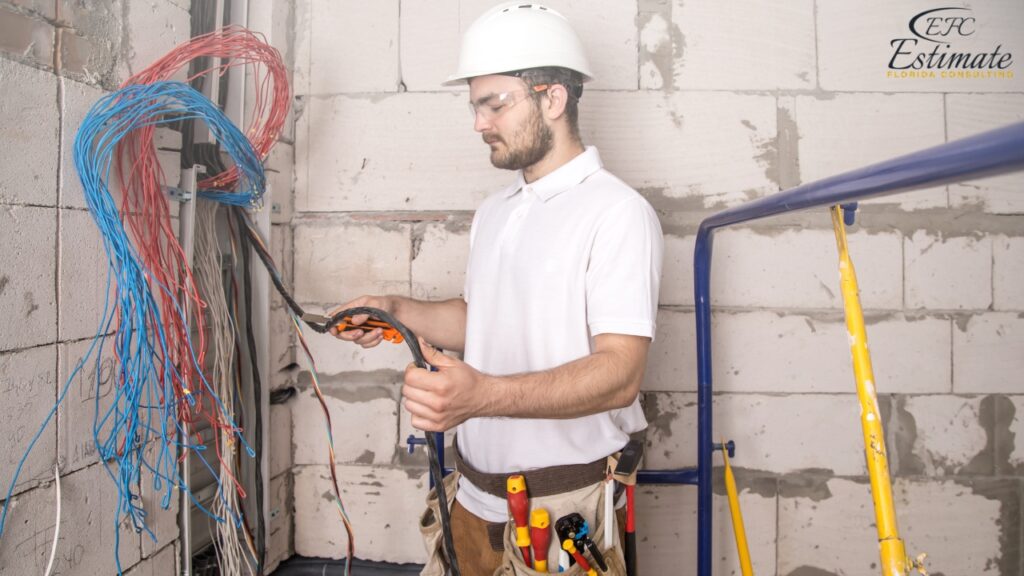
Cost Component | Estimated Cost |
Permits and Inspections | $420 – $1,260 |
Wall and Ceiling Repairs | $700 – $2,100 |
Miscellaneous Expenses | $280 – $420 |
Ensuring that all necessary permits and inspections are obtained is critical for the legal and safe completion of the rewiring project, protecting both the homeowner and the property. These additional costs, while sometimes overlooked, play a crucial role in the project’s overall success and compliance.
Factors Affecting the Cost of Rewiring a House
Age and Condition of the Existing Wiring
The age and condition of your home’s existing wiring can significantly impact the cost of rewiring. Older homes may have outdated or degraded wiring that requires more extensive work to replace. Homes with wiring that has degraded over time or that does not meet current codes may require more labor-intensive and costly upgrades. The condition of the wiring also affects the ease of removal and replacement, with more deteriorated systems often requiring additional work. Replacing severely deteriorated wiring might also involve addressing underlying structural issues.
Condition of Wiring | Estimated Cost |
Old and Degraded Wiring | $14,000 – $21,000 |
Moderately Aged Wiring | $12,740 – $16,800 |
Relatively New Wiring | $11,200 – $14,000 |
Older wiring systems may need more time and effort to remove, and there may be additional challenges, such as accessing hidden wires or dealing with hazardous materials like asbestos. The presence of outdated wiring types, such as knob-and-tube or aluminum wiring, can also complicate the rewiring process and increase costs. These older systems may require specialized handling and disposal techniques, adding to the overall project cost. Ensuring that all outdated components are thoroughly removed and replaced is essential for the safety and efficiency of the new electrical system.
Download Template For Electrical Project Breakdown
- Materials list updated to the zip code
- Fast delivery
- Data base of general contractors and sub-contractors
- Local estimators

Complexity of the Wiring
The complexity of the wiring system can also affect the cost. Homes with more complex electrical systems, such as those with multiple circuits, advanced lighting setups, or integrated smart home systems, will require more work. Complex wiring systems can add to the labor costs due to the need for specialized skills and additional time. Each additional component or feature increases the intricacy of the work, requiring meticulous planning and execution. Installing complex systems might also involve coordinating with other contractors or specialists.
Complexity | Estimated Cost |
Basic Wiring | $12,740 – $16,800 |
Intermediate Wiring | $16,800 – $21,000 |
Complex Wiring | $21,000 – $30,380+ |
Complex wiring projects may involve additional labor for installing specialized components, such as dimmer switches, home automation systems, or advanced security systems. Each added feature or complexity can increase both the materials and labor required, thereby increasing the overall cost. More intricate systems require detailed planning and precise execution, often involving additional safety checks and certifications. Ensuring that all complex components are correctly integrated into the overall system is crucial for their functionality and reliability.
Access and Accessibility
The ease of access to your home’s wiring can influence the cost. Homes with easily accessible wiring, such as those with unfinished basements or attics, will be less expensive to rewire than homes with finished walls and ceilings. Easier access reduces the time and effort required for electricians to install new wiring. The physical layout of the home and the ease of access to key wiring points play a significant role in determining labor costs. Simplifying access to wiring areas can also reduce potential damage to the home’s structure during the rewiring process.
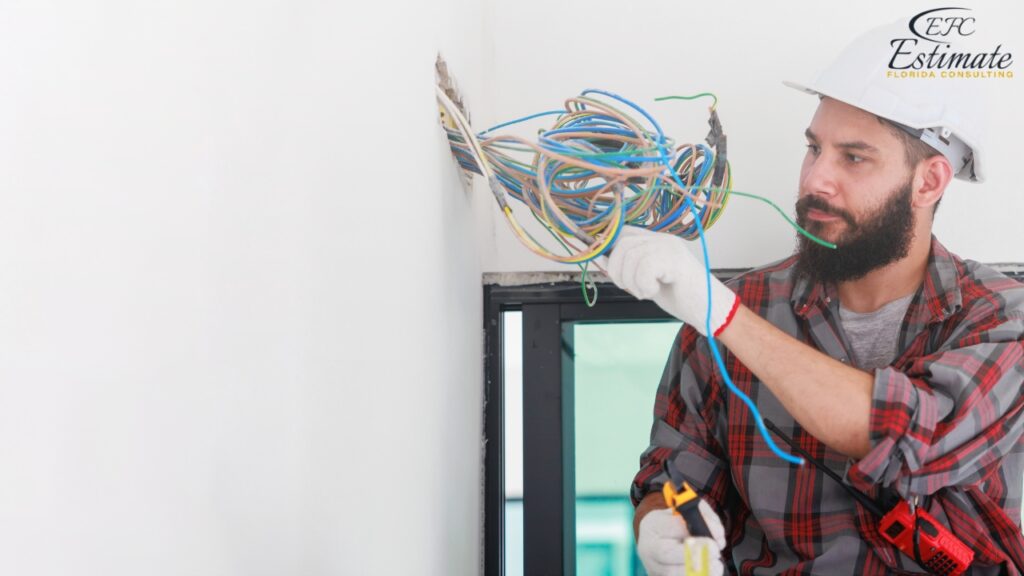
Accessibility | Estimated Cost |
Easily Accessible Wiring | $12,740 – $16,800 |
Moderately Accessible Wiring | $16,800 – $21,000 |
Difficult to Access Wiring | $21,000 – $30,380+ |
Rewiring homes with finished interiors may require more labor for cutting and patching drywall, which can increase both time and costs. Ensuring that all areas where wiring needs to be accessed are easily reachable can help control costs and reduce project duration. The degree of accessibility can significantly impact the ease and speed of the rewiring process, affecting the overall cost and timeline of the project. Planning for easy access to key wiring areas can streamline the rewiring process and minimize disruptions to the home’s interior.
Using a Rewiring Cost Estimator
A rewiring cost estimator can help you plan and budget your project effectively. Here’s how to use it:
Input House Details
Enter the size, age, and condition of the house to get a customized estimate. Accurate information ensures that the estimate reflects the specific needs of your project. Detailed input helps the estimator provide a realistic range of costs, accounting for all relevant factors. Providing comprehensive details about the home can enhance the accuracy of the cost estimate, making budgeting more precise.
Select Wiring Complexity
Choose the complexity of the wiring system, such as basic, intermediate, or complex. The estimator will provide cost ranges based on the selected complexity. Understanding the complexity of your electrical needs helps ensure that the estimate covers all aspects of the project. Tailoring the estimate to the specific requirements of your home’s electrical system can help identify potential cost-saving opportunities.
Customize Features
Add any additional features or customization options to see how they affect the overall cost. This customization helps you balance initial costs with long-term value. Custom features like smart home integration or specialized lighting can enhance functionality but may increase costs. Considering the benefits of each additional feature can help determine whether the investment is justified.
Review Cost Breakdown
Review the detailed cost breakdown, including materials, labor, and additional costs. A clear breakdown helps you understand where your money is going and identify potential areas for savings. This transparency allows for better financial planning and resource allocation. Understanding the distribution of costs can also help prioritize expenses and make informed decisions about budget allocation.
Plan and Budget
Use the cost estimate to plan and budget your project, considering any additional costs such as permits and wall repairs. Proper planning ensures that you have the funds available to complete the project successfully. A well-planned budget helps avoid financial surprises and ensures smooth project execution. Allocating resources effectively can also help manage unexpected expenses and ensure the project’s success.
Get 5 New Leads Next 7 Days With Our System
- Multi-Family Building
- Hotel Building
- Hospital Building
- Warehouse Building
- High-Rise Building
- Shopping Complex
Conclusion
Rewiring a 1,500 sq ft house is a crucial investment in safety and functionality. By understanding the various costs involved and the factors that influence these costs, you can make informed decisions and effectively manage your budget. Investing in high-quality materials, working with experienced professionals, and planning for contingencies can ensure a successful and cost-effective rewiring project. Whether you’re updating an older home or enhancing your current electrical system, proper planning and execution are key to achieving the desired results and ensuring the safety and efficiency of your home’s electrical infrastructure. By taking a proactive approach to your home’s electrical system, you can enhance safety, improve functionality, and increase property value, ensuring a better living environment for years to come. Properly managing the rewiring process not only ensures compliance with safety standards but also maximizes the long-term benefits of the upgrade.
FAQs
The cost typically ranges from $14,140 to $30,380 or more. This includes expenses for materials, labor, and additional costs such as permits and inspections. Factors like the age of the house, complexity of the wiring system, and local labor rates can also affect the total cost.
Rewiring a house offers several benefits, including improved safety, increased electrical capacity, enhanced energy efficiency, and increased property value. These benefits contribute to a more reliable and modern electrical system, ensuring the home meets current standards and future demands.
Rewiring eliminates old, degraded wiring that can pose fire hazards. Modern wiring materials and techniques enhance reliability and reduce the risk of electrical fires and other hazards. Upgraded wiring ensures all connections are secure and meets current electrical codes, significantly reducing safety risks.
Modern electrical systems can handle the increased demand from today’s appliances and electronics, preventing overloaded circuits and improving overall functionality. Rewiring allows the installation of additional outlets and circuits to accommodate new devices and technologies, enhancing convenience and performance.
Updated wiring reduces power loss and ensures efficient operation of electrical systems, potentially lowering your electricity bills. Energy-efficient wiring materials and techniques help minimize heat dissipation and electrical resistance, contributing to lower energy consumption and cost savings.
Rewiring ensures the electrical system meets current safety and efficiency standards, making your property more attractive to potential buyers. A modern, well-functioning electrical system is a key selling point, indicating a lower likelihood of future repairs and increased reliability.
The average cost breakdown includes:
- Materials: $4,200 – $8,400
- Labor: $8,540 – $18,200
- Additional Costs: $1,400 – $3,780
Materials include wiring, outlets, switches, circuit breakers, and other necessary components. High-quality materials ensure better durability and safety, providing long-term reliability and minimizing the risk of future issues.
Google Reviews



Process To Get The Cost to Rewire a 1,500 sq ft House Estimate Report
Here I am going to share some steps to get the cost to rewire a 1,500 sq ft house estimate report.
-
You need to send your plan to us.
You can send us your plan on info@estimatorflorida.com
-
You receive a quote for your project.
Before starting your project, we send you a quote for your service. That quote will have detailed information about your project. Here you will get information about the size, difficulty, complexity and bid date when determining pricing.
-
Get Estimate Report
Our team will takeoff and estimate your project. When we deliver you’ll receive a PDF and an Excel file of your estimate. We can also offer construction lead generation services for the jobs you’d like to pursue further.

